Why Antifragile Product Portfolios can help brands thrive in the discovery era.
By turning potential failures into growth opportunities, antifragile brands continuously optimize their portfolios and keep consumers engaged.
In the fast-moving consumer goods (FMCG) sector, traditional market retention strategies, such as advertising and pricing, are losing effectiveness. Smaller brands and new entrants are now ahead terms of innovation output. To stay ahead, we think major brands must strive towards antifragility—a concept of thriving in market volatility through continuous adaptation. This approach goes beyond resilience, emphasizing the need for constant iteration and consumer engagement through strategic partnerships and the Lean Startup methodology. This should be an addition to the main four marketing Ps, in which constant innovation is leveraged as a market penetration strategy.
Antifragile Portfolios: A Step Beyond Advertising
In an evolving FMCG market, where consumers are becoming more discovery led – prioritising new experiences, brands can no longer rely solely on traditional advertising to maintain relevance. The key to success lies in adaptability, allowing brands to change alongside shifting consumer preferences, and to access new opportunity spaces. By introducing new or reformulated products that resonate with changing tastes, brands can maximize their marketing strategy by adding constant innovation alongside the original 4 "Ps"—product, price, placement, and promotion.
This summary paper presents antifragility as a strategy that helps brands capitalize on market volatility through continuous innovation and portfolio evolution.
Understanding Antifragility in Business
Brand development can be viewed on a spectrum: resilience, robustness, and antifragility. Resilience involves withstanding economic downturns, while robustness uses mechanisms like advertising to endure adversity. However, even robustness is not enough for the long term, as it can lead to eventual decline. Antifragility, a concept from Nassim Nicholas Taleb, refers to systems that improve under stress and challenges. For brands, this means subjecting products to rigorous testing, learning from failures, and evolving with consumer preferences to stay ahead. By turning potential failures into growth opportunities, antifragile brands continuously optimize their portfolios and keep consumers engaged.
Reframing Failure as Innovation Accounting
Antifragile brands view failures not as setbacks but as critical learning steps. This mindset aligns with Eric Ries' concept of innovation accounting: money spent learning is not wasted, even if an experiment fails. When a product underperforms, a strategic change in the portfolio might be more effective than another marketing campaign. The key is constant consumer engagement through product innovation. New product launches capture consumer attention in ways that traditional advertising cannot, especially in the age of social media and digital trends, and ultimately can keep a brand top of mind. However, to be adopted into people’s repertoires, a product should still deliver both short-term and long-term rewards, but with adaptive iterations and more consumption occasions covered, this is more likely.
The Lean Startup Methodology: A Vehicle for Antifragility
To achieve true antifragility, brands must adopt an iterative approach, applying Lean Startup principles across the entire portfolio. This involves the "Build, Measure, Learn" model:
- Build: Start with small iterations to minimize costs and maximize learning. Test concepts, formulations, and market fit in incremental steps.
- Measure: Once products hit the market, gather real-world data, capturing consumer feedback, market trends, and competitive dynamics. This data guides hypotheses and further iterations.
- Learn: Treat market exposure as an ongoing test, not a final measure of success. Use insights and further tests to refine products, adapt to consumer needs, and launch multiple variations to fit diverse consumption occasions.
Antifragility in Action
Successful brands like Desperados and Lotus Biscoff have demonstrated antifragility by adapting their portfolios based on market trends. Desperados releases limited summer editions tailored to regional tastes (below), while Biscoff expanded into spreads, creating additional consumption opportunities. Similarly, Alpro extended its plant-based milk range to cater to health-conscious consumers. By testing, launching, and refining their products, these brands have remained competitive and responsive to market trends and kept consumers wanting more.

Driving Innovation Through Strategic Programs & Partnerships
Innovation is costly, and success is not always guaranteed. However, calculated risks can yield substantial rewards, paying for the entire investment. Brands should focus on building portfolios through testing, learning, and iteration rather than relying solely on acquisitions or advertising legacy. Partnerships with technology providers are crucial to drive innovation and design effective programs. Advanced tools and analytics enable brands to respond quickly to trends and validate concept-product fit.
Conclusion: Embracing Antifragility for Long-Term Success
To remain competitive in the ever-changing FMCG market, brands must adopt an antifragile approach that emphasizes continuous innovation, strategic partnerships, and consumer engagement. The Lean Startup methodology offers a blueprint for brands to build, measure, and learn effectively. By shifting focus from a single product to an evolving portfolio, brands can navigate market turbulence and capitalize on emerging trends, embodying true antifragility, staying top of mind, and landing on the perfect market-concept-product fit.
An antifragile approach to innovation and renovation is at the heart of MMR’s new approach to product testing, Product Hub. For more details on how your brand can move towards an antifragility model, contact us to arrange a no obligation demonstration.
This article is based upon a more extensive white paper, which is available by writing to its author, Alex Dobromir, at a.dobromir@mmr-research.com
Don't forget to sign up to be a part of our special webcast where we'll dive into brand new research supporting the Discovery Era and explore what actions to take. Join your industry peers for this exclusive event on October 1st!